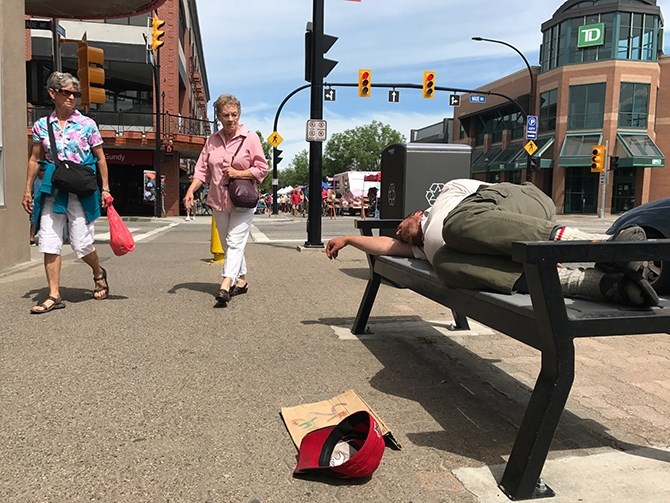
A man is seen sleeping on a bench in Penticton's downtown in this photo submitted by the City of Penticton.
Image Credit: SUBMITTED/City of Penticton
June 28, 2017 - 2:30 PM
PENTICTON - A resurgence in transient and homeless numbers on Penticton’s streets has the City looking to higher levels of government for help.
Penticton mayor Andrew Jakubeit says the number of homeless, transients and those with addiction issues who live on the street spike in the summer as warmer weather make them more visible on the street.
Jakubeit says this year, homeless people and squatters have been present in high profile parts of the community, causing members of the public to speak out and ask for something to be done about it.
The mayor says two meetings are in the works to discuss the issues.
The first will be a Town Hall Meeting on July 17 at 7 p.m., with the RCMP at the Penticton Convention Centre where the discussion will centre around policing, health and addiction issues. The City is also organizing a symposium before the end of July with stakeholders and bylaw officers in hopes of creating a positive approach to resolving homeless issues in order put a plan in place before the colder weather returns.
“Many cities are struggling with this. It’s an ongoing issue, and it’s not the City who is the lead agency in resolving the issues, but everyone points at us,” Jakubeit says.
The City is an active partner along with other service and social agencies, but Jakubeit says the province in particular must come to the table with dollars and solutions.
Jakubeit says the problem is made more difficult because “most people are supportive of social services, but not in their backyards.”
“If you look on social media, there are opinions on both ends of the spectrum. It becomes a divisive issue. We’re hoping the new government takes these concerns seriously, because we really need the province and its ministries to step up in a big way,” he says.
Jakubeit says at the last meeting of 100 Homes for Penticton, a society devoted to finding shelter for the City’s homeless, he heard from the consultant who works with the City of Medicine Hat in Alberta, who developed a successful shelter program for the homeless there.
“They had the province and health authority step up in a big way. That’s what we’re missing. That’s what needs to happen here,” he says.
“When eight cents out of every tax dollar is municipal and the rest is federal or provincial funds, communities don’t have the resources for these issues. It’s not fair to put all the pressure on the RCMP either, who are actually acting as front line social workers. We need them to be more than that,” Jakubeit says.
To contact a reporter for this story, email Steve Arstad or call 250-488-3065 or email the editor. You can also submit photos, videos or news tips to the newsroom and be entered to win a monthly prize draw.
We welcome your comments and opinions on our stories but play nice. We won't censor or delete comments unless they contain off-topic statements or links, unnecessary vulgarity, false facts, spam or obviously fake profiles. If you have any concerns about what you see in comments, email the editor in the link above.
News from © iNFOnews, 2017